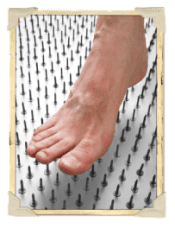Neuropathy
Neuropathy
 Neuropathy is a term that is often heard when discussing foot complications. It seems that patients generally understand that neuropathy is a change in the nervous system often times in the foot but they have a terrible time describing how it feels. “My feet tingle and burn” or “My feet are numb but they still hurt” is often said, realizing that it seems to make no sense. Neuropathy is a diagnostic term that is quite large and includes all of these descriptions along with a few hundred more! When the nerves are undergoing change a patient will feel these changes in many ways. Tingling, burning, itching, feeling wet, feeling like something is crawling on them or just sharp pain to name a few. Our Doctors assesses many patients with neuropathy each day. Because the foot has many different sized nerves in it and each size nerve serves different purposes the testing may range from light touch, vibration, temperature, position and sharp vs. dull to name just a few.
Neuropathy is a term that is often heard when discussing foot complications. It seems that patients generally understand that neuropathy is a change in the nervous system often times in the foot but they have a terrible time describing how it feels. “My feet tingle and burn” or “My feet are numb but they still hurt” is often said, realizing that it seems to make no sense. Neuropathy is a diagnostic term that is quite large and includes all of these descriptions along with a few hundred more! When the nerves are undergoing change a patient will feel these changes in many ways. Tingling, burning, itching, feeling wet, feeling like something is crawling on them or just sharp pain to name a few. Our Doctors assesses many patients with neuropathy each day. Because the foot has many different sized nerves in it and each size nerve serves different purposes the testing may range from light touch, vibration, temperature, position and sharp vs. dull to name just a few.
There are many causes of neuropathy in the lower legs. Diabetes is by far the most common followed by alcoholism, back injury, lead poisoning and even medication induced neuropathy. The most important point is to try to limit further injury of the nerves by addressing any underlying causes that are within our control. Then we must address the care of the painful condition and attempt to reduce its impact on each patient. Whether it is a loss of sleep at night, an aggravating pain while sitting still or an increased risk of foot ulcerations due to a loss of feeling The Doctors at ETFA are very experienced in improving their patient’s quality of life.
There are many conditions that mimic early neuropathic changes and it takes a physician that sees this condition regularly to properly recognize it. The Doctors at ETFA will be happy to help you through the maze of neuropathy and help you return to a healthy active lifestyle.
PLEASE NOTE:
The information contained in this article is not intended to provide advice for individual problems, nor to substitute for professional advice or care from a physician. For answers to specific questions concerning your personal circumstances, you should consult your physician directly.
